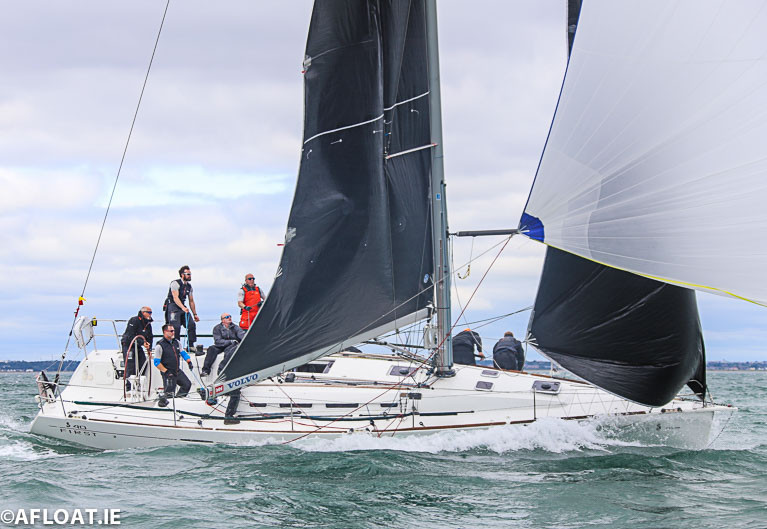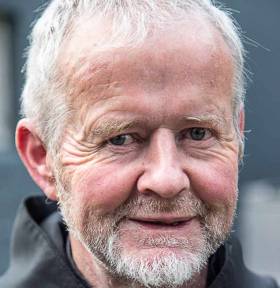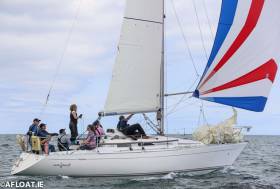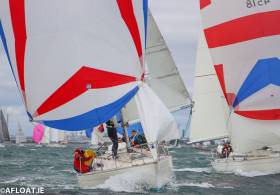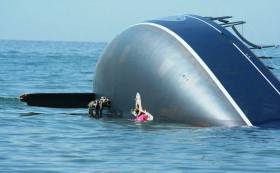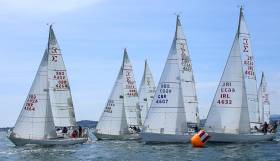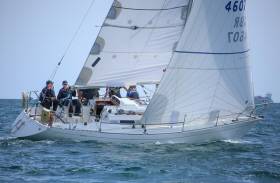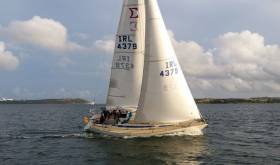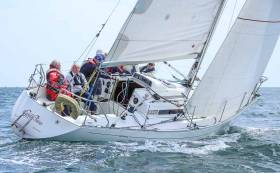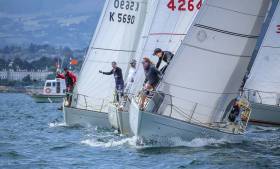Displaying items by tag: Sigma 33
Sigma 33s Lead the Entries for June's Bangor Town Regatta
Bangor Town Regatta entry is now open and it’s the Sigma 33s who lead the way with five entries already for the June event writes Betty Armstrong.
With Charles Hurst Jaguar Land Rover as headline sponsors, the event incorporates the Sigma British and Irish championships, so Class 6 is already showing considerable interest.
It is also part of the RC35 Celtic Challenge.
The 2018 regatta was a resounding success so with this year repeating the tried and tested four-day formula out of the Quay Marina Bangor, 2020 should be no different.
"This year repeating the tried and tested four-day formula"
There’s racing for ten classes ranging from the biggies to the smaller RS Elites, and Waverley and Fairy dayboats.
The Sigmas listed include the well-known local successful Squawk (Emma and Paul Prentice) as well as Mark Bradshaw’s Busy Beaver from Fairlie, James Miller’s Mayrise (Helensburgh), Insider owned by Stephan Mullaney of Howth and Partisan (Dan Lewis).
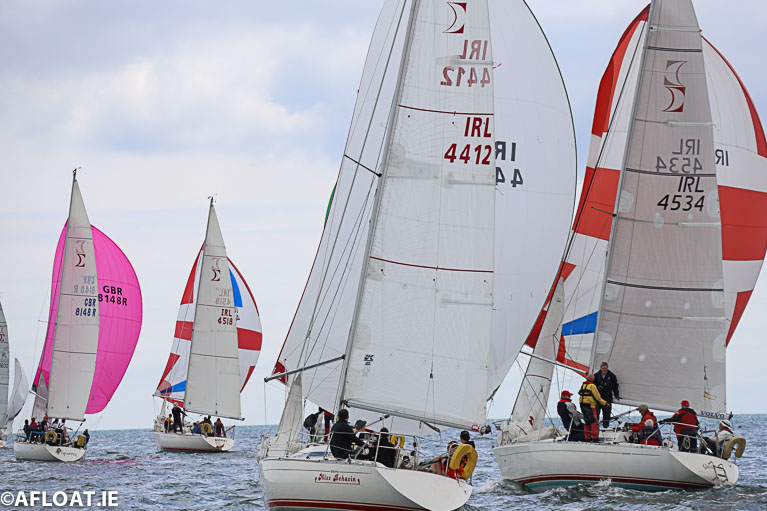 Sigma 33s will race for National Championships honours at Bangor Town Regatta in June Photo: Afloat
Sigma 33s will race for National Championships honours at Bangor Town Regatta in June Photo: Afloat
Jay Colville’s Forty Licks from East Down and RUYC comes with history, having clocked the same points as Rockabill VI in Division 0 in last year’s Frank Keane BMW ICRA Nationals in Dun Laoghaire.
Murray McDonald’s Port Edgar based Hunter 707, Autism on the Water, races in Class 3. It represents an internationally recognised charity that provides growth in the awareness of Autism and helps Autistic people access sailing and boating in general.
Phil Davis’s RUYC regular Giggle, completes the list so far.
Brother Anthony Keane of Glenstal Abbey: Why Do We Own Boats?
Scribbler, my Sigma 33 yacht, was hauled ashore this week. Now she stands in her cradle in Castlepoint Boatyard in Crosshaven in Cork Harbour for her out-of-the-water winter rest. It is the annual end-of-season ritual. There are owners who don’t any more do an off-season haul-out. They winter on a marina, or on sheltered moorings and only haul for a hull-clean prior to the start of the new season. There are the particularly fortunate owners who can ‘winter’ their boats close to their homes, nicely at hand for the off-season maintenance work!
I come from the ‘old school’ thinking that it is best to ‘give the boat a dry-out.’ GRP, the plastic boats, benefit from it, I was told from the first boat purchase I made. Not everyone agrees these days but, whatever the off-season decision for your boat, the atmosphere that is about is definitely ‘end-of-season,’ with Autumnal and October cruiser Leagues concluding this weekend at clubs around the country.
More boats will be hauled ashore over the next week or so. There are the hardy souls in cruisers who sail on into December, when the weather can often be magnanimous, the dinghy sailors who do so year-round and the Lasers who ‘frostbite’.
As Scribbler was ‘laid-up’ this week I got to thinking about the perennial questions – why do we have boats, why do we go out in them and, of course, are they worth the expense and the effort needed to keep them going?
One of the best – and humorous – answers to those questions which I have heard came from Bro. Anthony Keane, who has been so much involved in the restoration of the famous Ilen. From Leitrim originally, he has been a monk at Glenstal Abbey since 1965 and his study of theology and wood in which he is quite an expert, as shown in the Ilen project, has enabled him to enjoin the topics with the maritime sphere and boating. I’ve admired the content of speeches he has made at the various stages of Ilen’s restoration and its launch and reported them here.
He was particularly outstanding at the launch of the restored Dublin Bay 21, Naneen, in Kilrush last month when I recorded his dissertation on why we have boats and go to sea. I’ve been waiting for the right moment to broadcast it, which has come with this week’s ‘hauling’ reflections.
Bro. Anthony’s thoughts on boats are worth listening to!
Listen to the Podcast below
Scottish Sigma 33 Crews Are 1,2,3 at Irish Championships
Scotland's Leaky Roof 2 sailed by Alan Harper/Robertson, Eric Robertson & Kirsty Robertson from Cove Sailing Club were winners of the Sigma 33 Irish Open Championships sailed as part of Volvo Dun Laoghaire Regatta 2019.
In fact, Scottish visitors took the top three places in the 20-boat Championsship fleet with James Miller's Mayrise from Helensburgh Sailing Club second overall and Fairlie Yacht Club entry Busy Beaver Mark Bradshaw and Jack Gallagher third.
The top Irish boat was Stephen and Des Mullaney's Insider from Howth Yacht Club with the distinctive Sail Number 'IRL4444' in fifth place overall.
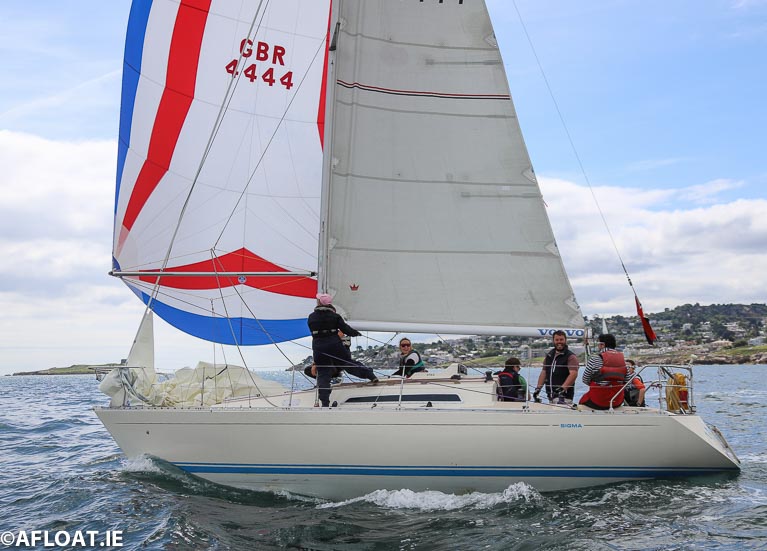 Stephen and Des Mullaney's Insider from Howth Yacht Club
Stephen and Des Mullaney's Insider from Howth Yacht Club
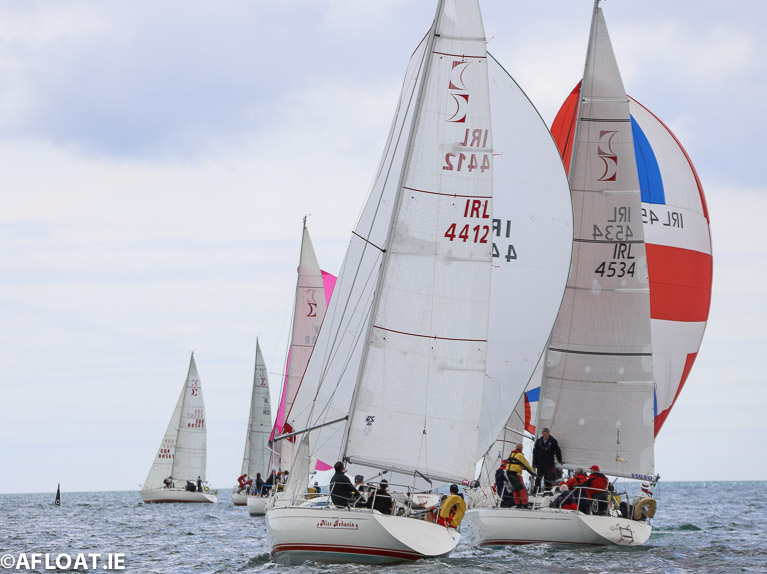
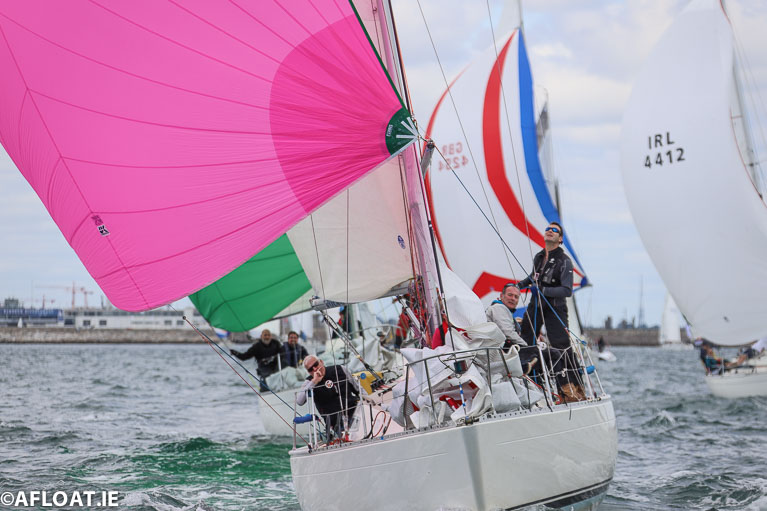
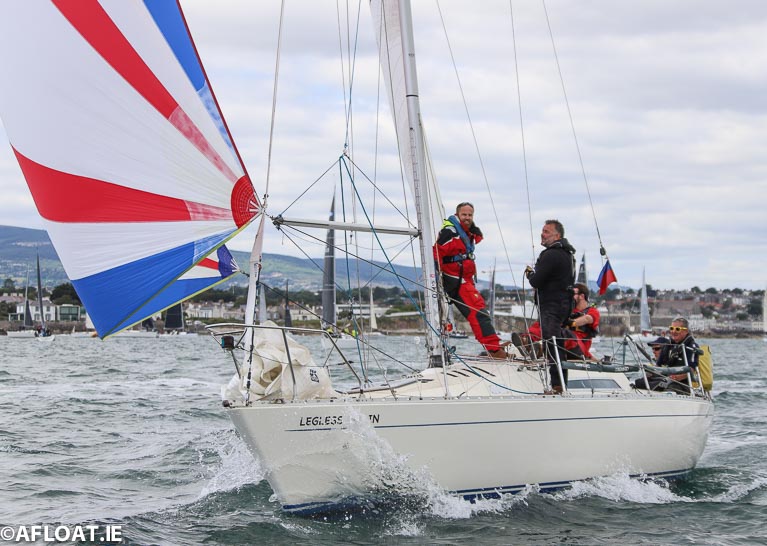
Scottish crews are in command at the 20-boat Sigma 33 Irish National Championships hosted as part of Volvo Dun Laoghaire Regatta.
After four races sailed and one discard, James Miller's Mayrise of Helensburgh Sailing Club leads Leaky Roof 2 (Alan Harper/Robertson, Eric Robertson & Kirsty Robertson) of Cove Sailing Club by three points.
In third place overall is Fairlie Yacht Club's Busy Beaver (Mark Bradshaw & Jack Gallagher).
Best of the Irish is Paul & Emma Prentice's Squawk from Ballyholme Yacht Club in fourth place but you have to go as low tenth to find the first Dublin Bay boat, Joe Conway's Elandra from the Royal Irish Yacht Club.
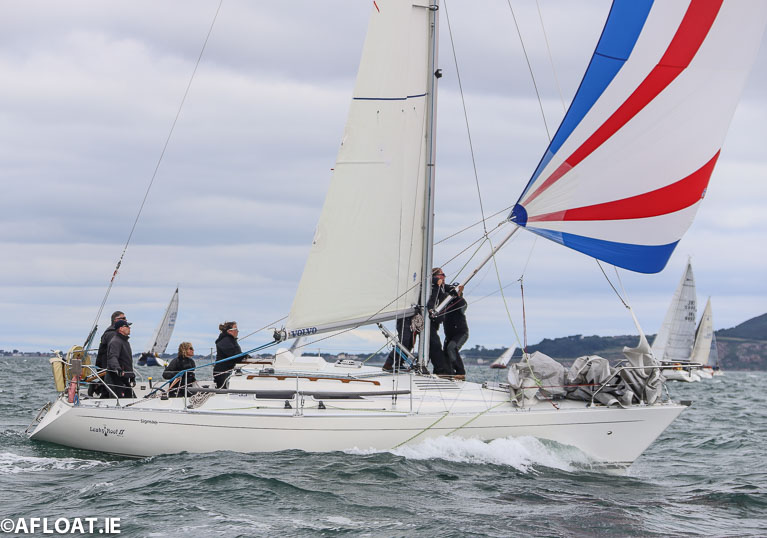 Leaky Roof 2 (Alan Harper/Robertson, Eric Robertson & Kirsty Robertson) of Cove Sailing Club
Leaky Roof 2 (Alan Harper/Robertson, Eric Robertson & Kirsty Robertson) of Cove Sailing Club
Racing continues tomorrow.
“We write to remind you that, due to the age of your vessel, Underwriters require an update of the last survey and valuation report, to be carried out ashore by a qualified marine surveyor who carries professional indemnity cover, prior to your policy’s next renewal date.”
The insurers of my yacht Scribbler issued their demand and so, my lovely boat in which I have had so much enjoyment and trusted her so much and she has responded so well to looking after me and all aboard, has been subjected to the poking and prodding of the surveyor and a detailed 22-page report has issued which concludes that: “the vessel has been constructed to a high standard and the boat’s present condition is considered very good for the boat’s age.”
That is 33 years this year and the conclusion, which pleases me, is a tribute to the Sigma 33 builders, Marine Projects of Plymouth and the care and attention that has been lavished on her.
At present, she is getting TLC following her health check-up and one of those checks included an examination of the keel bolts.
That got me to thinking about whether enough attention is given to this important part of the boat and how, when we have been well heeled-over during strong wind conditions when racing, so much about the safety of the boat and all aboard is dependent upon the “righting moment” and the keel.
How much attention do owners give to that vitally important part of the boat and its structure?
There have been many changes over the years from traditional long-keeled boats, integral keels to bolted-on keels and so on and, in the modern conception of offshore yachts, swinging keels.
Doing a bit of research about keels I learned that World Sailing is launching an In-Build Validation Scheme to look at the fabrication of the keel and attachment in yachts and, though this is primarily being developed to address what is described as “the increasing loss of keels on offshore sailboats,” it is an interesting thought, is it not, to consider one’s keel.
World Sailing is to produce its Validation Scheme this August and it will then be discussed at the organisation’s annual conference.
What will it all mean for those of us whose primary engagement is club sailing or coastal cruising and even more for those who cruise abroad and for the offshore racers?
That remains to be seen, but for my beloved Scribbler, who’ve looked after her for so many years, we’ve checked all keelboats and, as she ages to maturity over the years ahead, we’ll be implementing a keel bolt replacement programme as decided necessary while she remains giving us sailing enjoyment.
Very important to mind the bit of the boat that keeps you upright!
• Listen to the Podcast below
This year the Sigma 33 class is celebrating the launch of the first boat forty years ago.
With 408 boats built between then and 1991, the boats proved a great success, not only for builders Marine Projects in Plymouth but also a generation of one design keelboat sailors across the UK and Ireland.
"the class works hard to keep the boats one design philosophy"
With the class working hard to keep the boats one design philosophy, it is still proving a very popular boat with 20 boats frequently making the start line in most of the bigger regattas.
Last year for the first ever UK and Irish Sigma 33 Championships at the Royal St. George Yacht Club on Dublin Bay a record fleet gathered at Dun Laoghaire.
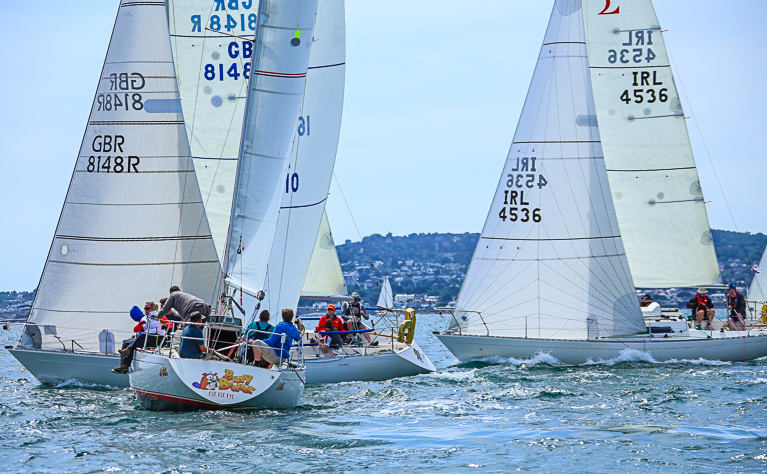 Sigma 33s racing on Dublin Bay Photo: Afloat.ie
Sigma 33s racing on Dublin Bay Photo: Afloat.ie
Currently, there are 16 boats entered for the July's Volvo Dun Laoghaire Regatta and in an effort to push this to 26 the Irish East Coast Class Association has offered to refund the entries for two boats if the total entry reaches 26 by the close of the early bird entry date of March 31st.
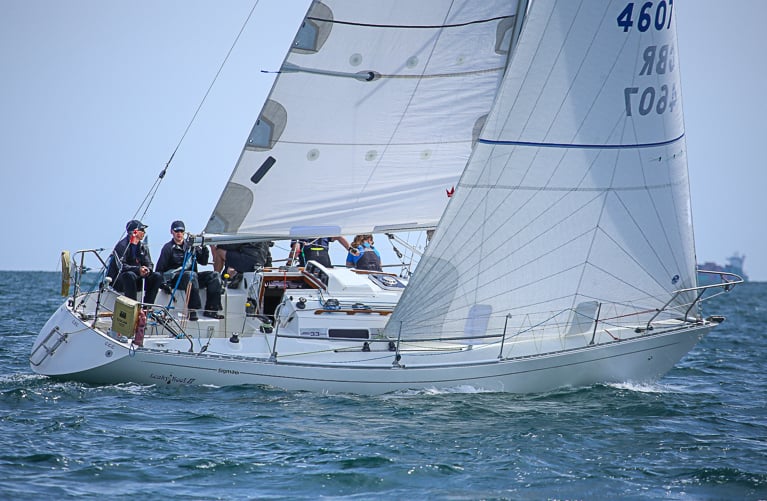 Scottish visitor Leaky Roof 2 was the winner of the 2018 UK and Irish Championships on Dublin Bay Photo: Afloat.ie
Scottish visitor Leaky Roof 2 was the winner of the 2018 UK and Irish Championships on Dublin Bay Photo: Afloat.ie
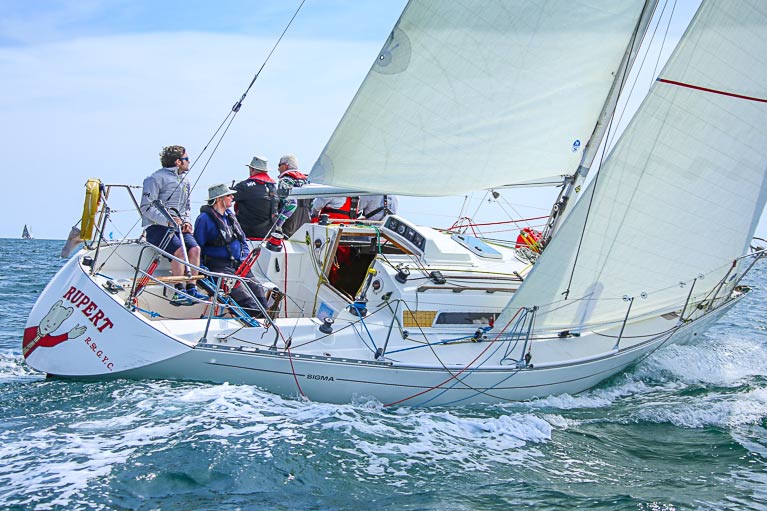 Philip (left) and Richard Lovegrove sailing the Sigma 33 ‘Rupert’, winners of the Waterhouse Shield for the best performing DBSC cruiser-racer in 2018. Photograph: Afloat.ie
Philip (left) and Richard Lovegrove sailing the Sigma 33 ‘Rupert’, winners of the Waterhouse Shield for the best performing DBSC cruiser-racer in 2018. Photograph: Afloat.ie
Entries can be made on the VLDR website here
The cost of entry is €220.00.
If the total entries reach 26 by March 31st a draw will take place the following week in which the additional entries received will be included. €220.00 will be refunded to the two boats drawn.
It looks to be all good news for the Sigma 33 class in 2019 with another strong entry of 16 boats entered to date for next July's Volvo Dun Laoghaire Regatta, over six months before the event.
It promises to be another competitive regatta for the fleet and one of the biggest one-design cruiser classes at the event as the biennial festival itself promises a record entry to date with over 228 boats signed up across 32 competing classes.
The regatta of 2018 at the RSt.GYC will live long in the memory for the class as one of the most competitive and enjoyable racing experienced by the fleet during the Class and Irish Championships in June 2018, thanks to the perfect weather and the PRO David Lovegrove who ran 10 great races over the three days.
"Entries for the last two for Sigma 33 events in Dun Laoghaire have been about 20+"
The Class Championships were won by Alan Harper “Leaky Roof 2” from Scotland and the Irish Championships by Paul & Emma Prentice “Squawk” Royal Ulster Yacht Club. Incidentally, both winners have already entered the 2019 regatta. An indication that Dun Laoghaire 2019 is going to be as competitive as ever for Sigma 33’s.
Entries for the last two for Sigma 33 events in Dun Laoghaire have been about 20+ and 2019 competitors are expected to match these levels which is an exciting prospect for the Class and particularly the 140+ competitors.
In addition, the fleet will have a new Class Captain with Joe Conway from RIYC “Elandra” due to take over on 14th January 2019 at the AGM in the RIYC.
Dirty Boats & Dirty Ports
Hello and welcome to the weekly MacSweeney Podcast ….
It’s been a week with interesting topics, from dirty boats to dirty ports, the pleasant sight of island-racing dinghies but the nastier tale of what submarines might be doing off the West Coast…
The dirty bottom of Scribbler, my Sigma 33, wasn’t pleasant. The amount of underwater hull growth this year has been heavier than in previous Summers, despite two coats of anti-foul and monthly scrubbing since she was launched in late April… A green weed adhered to the bow and the rudder and other boat owners in Cork Harbour told me that they had the same problem and, as we all know, hull growth slows down speed through the water. Now, I know that some of the most dedicated racers haul regularly or dry-sail …. But that’s not really feasible for ordinary folk who race weekly club events …Higher water temperatures during this Summer have been blamed by some owners….. I’d like to know if the same “dirty hull” problem has been encountered in other areas of the coast…. Or could it be the quality of anti-foul?
Another problem, identified to me by some visitors from national and foreign climes this Summer, is the lack of rubbish disposal for visiting cruising boats in small harbours and anchorages around Ireland. Mostly, visitors have told me, marinas have this sorted but I’ve heard stories of visiting crews wandering around smaller harbours or little ports off which they’ve anchored, with a rubbish bag looking for a place to dispose of it …And, in a plane on the way back from Norway during the week, I read a missive from one British cruising sailor: “Dear Ireland, why do you make cruising sailors suffer. This matter is much talked about among visiting yachts,” he said and suggested there would be some who wouldn’t bother to visit Ireland because of it. Paul Heiney was writing in the UK magazine Sailing Today, where he said he had a “stunning trip amongst the rugged beauty of Ireland” – but was highly critical of the lack of rubbish disposal facilities.
Listen to the Podcast about another disposal problem, along the coastline from Donegal to Galway and why the Irish Whale and Dolphin Group wants to know what submarines are doing off our West Coast …and also how one Cork Harbour club made a clean sweep of all the trophies at another club….
Dermot Clarke and Patrick Maguire's Sigma 33 Gwilli Two of the Royal St. George Yacht Club was the winner of Dublin Bay Sailing Club's Cruiser 2 Coastal Race to Greystones Harbour in County Wicklow yesterday by the narrowest of margins.
After nearly two hours of racing in 20–knots, Gwili Two won by less than one foot at the finish from clubmate Richard Lovegrove in the sister ship, Rupert. In a clean sweep for the Sigma 33 design under IRC rating, Henry Leonard's & Bobby Kerr's Leeuwin from the Royal Irish Yacht Club was third.
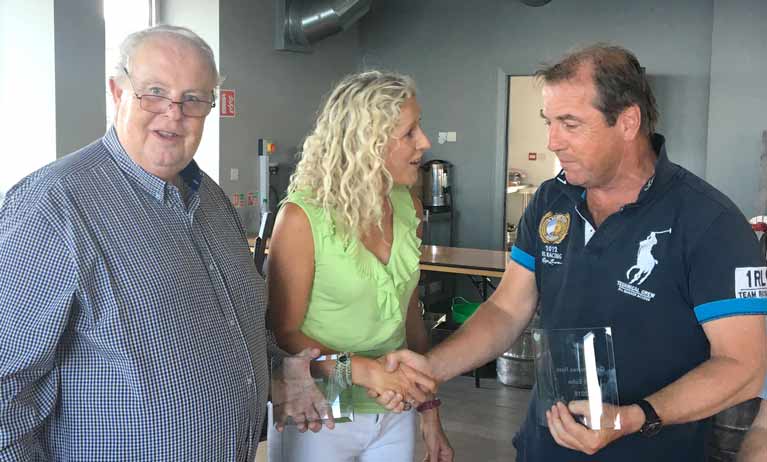 Gwilli Two skipper Paddy Maguire (left) is presented with the Class's Nightcap Trophy by Greystones Sailing Club's Darragh Cafferkey. DBSC Cruiser Two Captain Adrienne Jermyn (centre) won the ECHO prize on Helterskelter
Gwilli Two skipper Paddy Maguire (left) is presented with the Class's Nightcap Trophy by Greystones Sailing Club's Darragh Cafferkey. DBSC Cruiser Two Captain Adrienne Jermyn (centre) won the ECHO prize on Helterskelter
Ten boats started the annual race and seven boats finished. The Gwilli Two crew were presented with the Class's Nightcap Trophy by Greystones Sailing Club's Darragh Cafferkey.
Under ECHO handicap, Adrienne & Averil Jermyn's Helterskelter won from Aztec with Utopia (Brendan and Gerard Healy) third.
Scottish visitors dominated a ten race series to take all three places on the podium of the Sigma 33 Class UK and Irish Championships 2018 on Dublin Bay this weekend.
The Royal St. George Yacht Club event attracted 23 entries, some 161 competitors from five countries. It was a record fleet for the Dun Laoghaire Club's first ever staging of the UK and Irish Championships. The event was run with support from BMW and UK Sailmakers Ireland.
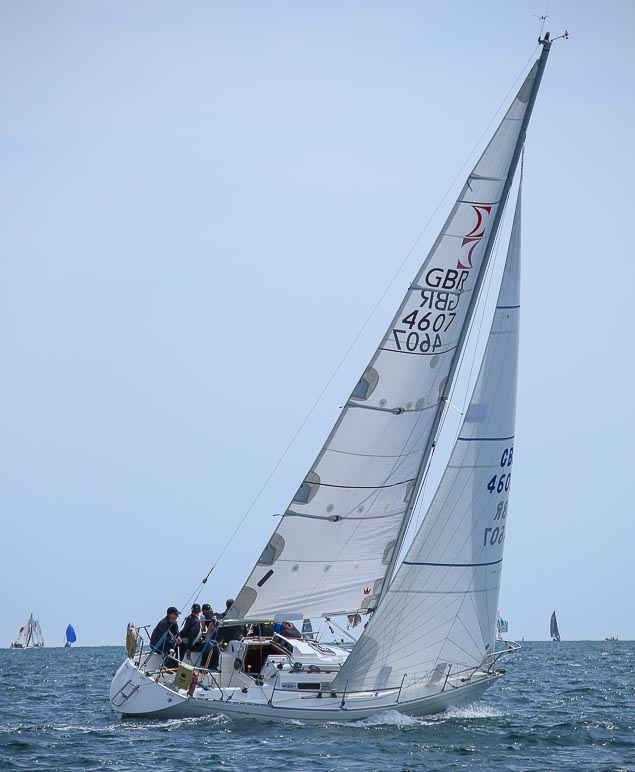 Sigma 33 Champion Leaky Roof II (Alan Harper) had eight results in the top five Photo: Afloat.ie
Sigma 33 Champion Leaky Roof II (Alan Harper) had eight results in the top five Photo: Afloat.ie
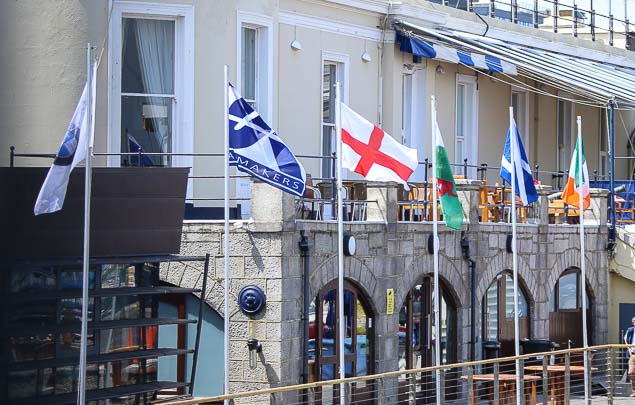 England, Scotland, Wales and Ireland were represented at the Sigma 33 Championships on Dublin Bay Photo: Afloat.ie
England, Scotland, Wales and Ireland were represented at the Sigma 33 Championships on Dublin Bay Photo: Afloat.ie
Consistent sailing from Alan Harper's Leaky Roof II – with eight results in the top five – meant the Cove Sailing Club entry continued her overnight lead to take the title by five points.
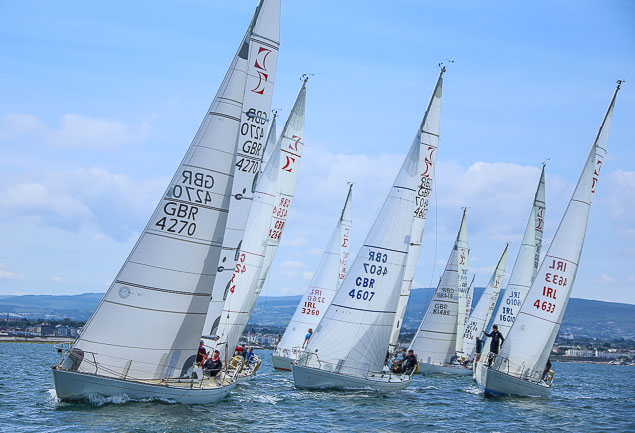 (Above and below) The start of one of ten Sigma 33 races Photos: Afloat.ie
(Above and below) The start of one of ten Sigma 33 races Photos: Afloat.ie
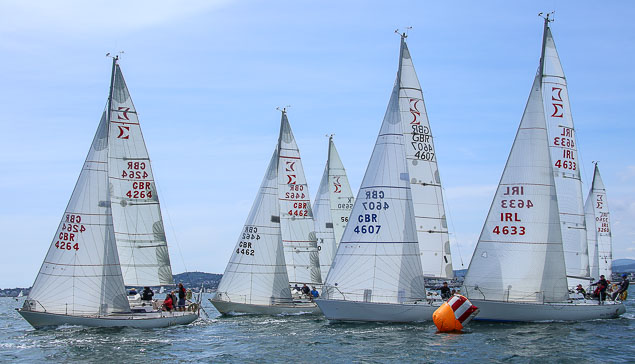
15 visiting boats from 13 clubs and eight Dublin Bay boats enjoyed the well-run championships that saw a full series sailed in light sea breezes since Friday.
Second overall was Grant Simpson's Miss Behavin from Helensburgh SC. Third was Busy Beaver skippered by Mark Bradshaw of Fairlie YC.
Top Irish boat was Paul Prentice's Squawk from Royal Ulster who took fifth overall with a final race win.
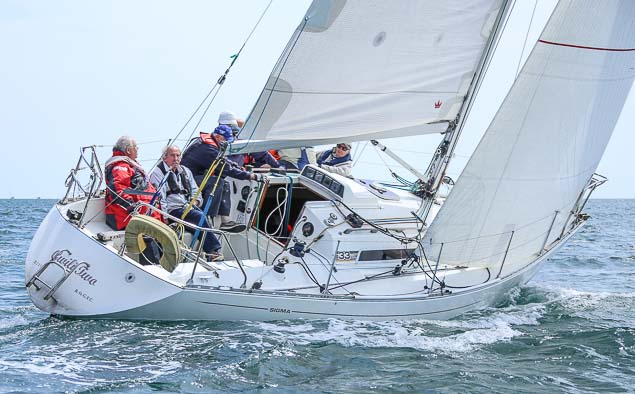 Paddy Maguire's Gwilli Two from the Royal St. George Yacht Club was the top Dublin Bay boat at the Sigma 33 Championships Photo: Afloat.ie
Paddy Maguire's Gwilli Two from the Royal St. George Yacht Club was the top Dublin Bay boat at the Sigma 33 Championships Photo: Afloat.ie
The top Dublin Bay boat was Gwili Two skippered by Paddy Maguire of the RStGYC in tenth place.
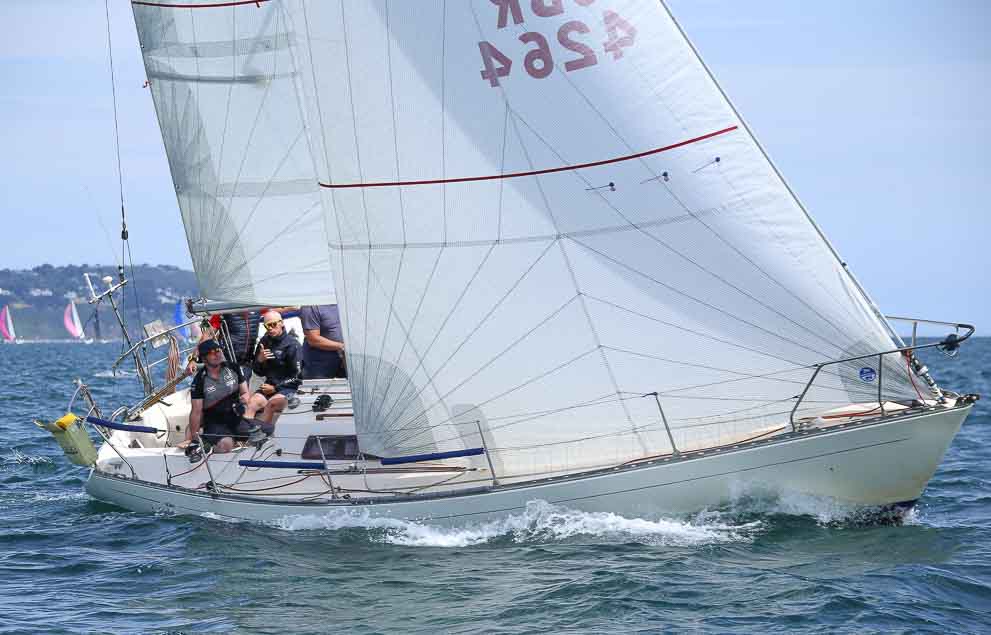 British visitor Andy Laming's Afrita of St Mawes from St Mawes SC Photo: Afloat.ie
British visitor Andy Laming's Afrita of St Mawes from St Mawes SC Photo: Afloat.ie
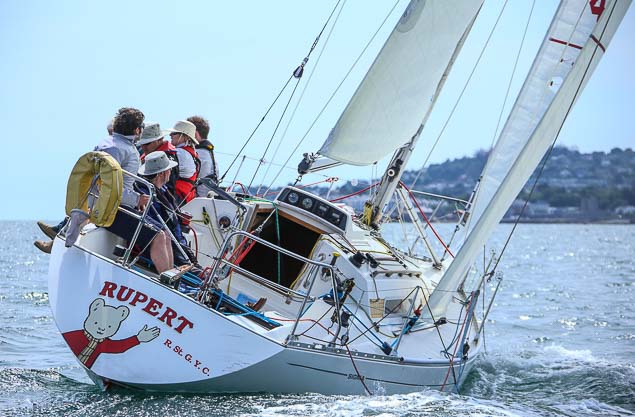 Dick Lovegrove's Rupert from the host club Photo: Afloat.ie
Dick Lovegrove's Rupert from the host club Photo: Afloat.ie
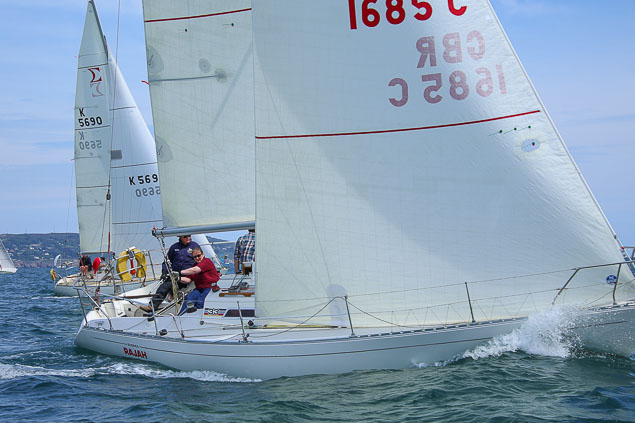 Clyde Cruising Club's Rajah skippered by Roy Summers was eighth overall
Clyde Cruising Club's Rajah skippered by Roy Summers was eighth overall
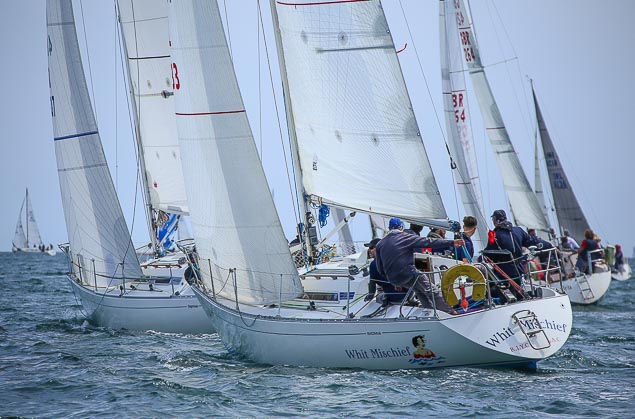 John Doyle's Whit Mischief from Arklow SC looks for clear air after a start Photo: Afloat.ie
John Doyle's Whit Mischief from Arklow SC looks for clear air after a start Photo: Afloat.ie
Results are provisional. Click here
See all Afloat's Sigma 33 coverage in one handy link here



























